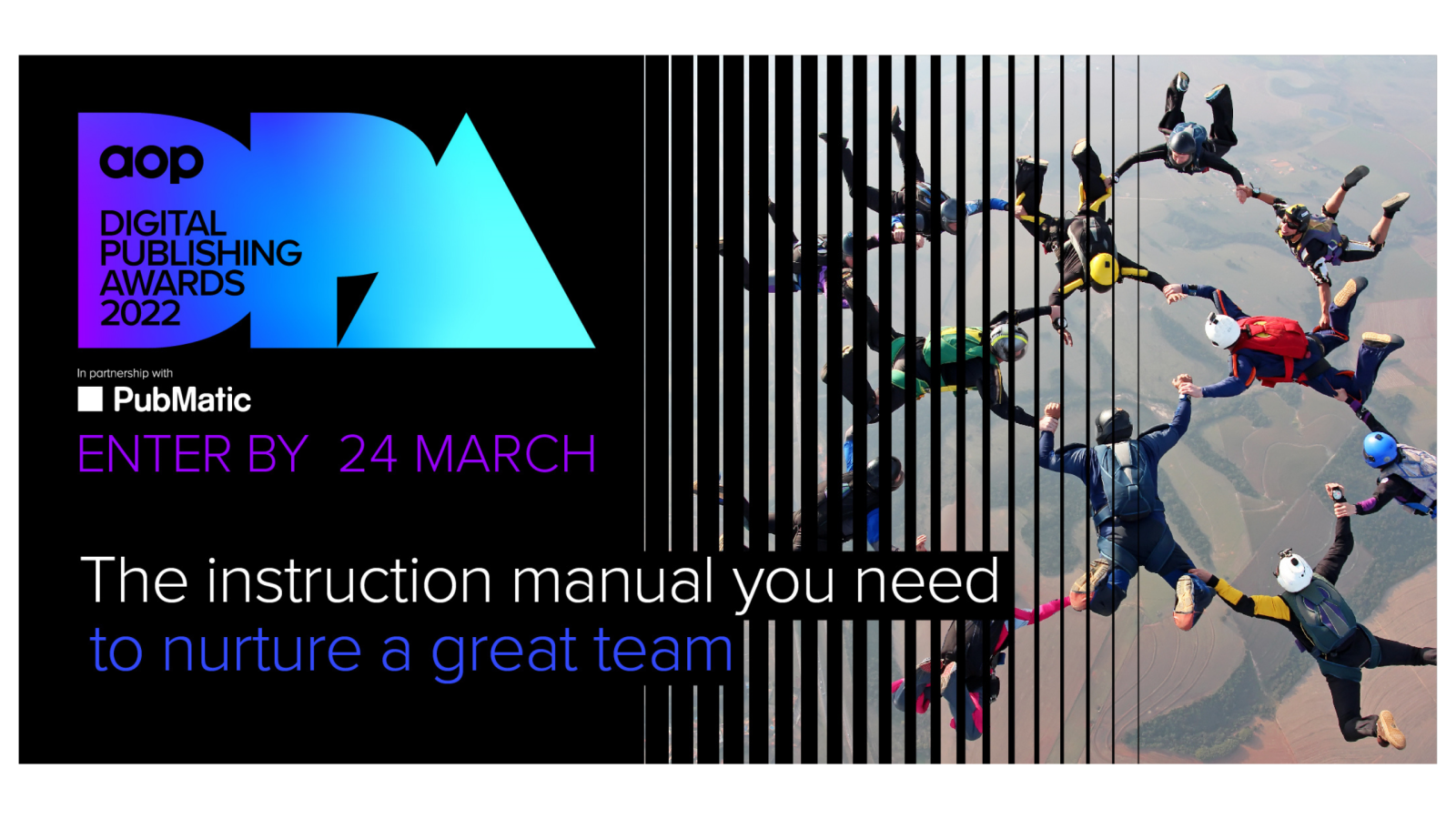
The instruction manual you need to nurture a great team
Published: 04 Mar 2022
At the AOP Awards, we put the spotlight on the teams that are leaving their mark on the organisation. But what are the hallmarks of a great team? And how can leaders work to successfully attract the right mix of talent to their teams?
To understand, we asked our AOP Awards jury to share their insight and we’ve collated these answers to help you take your team to the next level…
Several of our judges stressed the importance of auditing your team to understand what skills you’re lacking, and being open-minded about who might be able to help you plug those gaps. “It’s worth looking beyond the obvious,” shared Liv Horner, Product Manager at Haymarket. “Talent from different disciplines with transferable skills or from different sectors should be encouraged to bring in new perspectives.” Samara Hocihara, Head of Campaign Planning and Operations at The Telegraph, agreed, suggesting that “whenever possible, be open to recruiting people that have different backgrounds, that will bring skills that the wider team would benefit / learn from.”
However, if you’re intending to hire from a different team or discipline, then it’s critical to understand what it is that you’re really looking for first. “Don’t baffle prospective team members with jargon and overly-complicated job descriptions. Really think about what skills are essential to the role,” stressed Kerys Arundell, Head of Ad Operations - Automotive at Bauer. “If there are interpersonal skills that you believe are important in a role, don’t scare off potentially excellent talent by suggesting that experience in a niche system or process is essential when it’s something you could train them to use.” Shannie Mears, Co-founder & Head of Talent at The Elephant Room, agreed: “Building teams is about [finding] those who can complement each other’s strength. There have to be points of difference to learn and grow.”
To create a truly successful team, then, you need to not only understand the skills gaps in your organisations, but also how the team will come together as an ensemble. “Hire personality types that will complement the existing team through knowing what strengths and weaknesses you already have,” recommended Caroline Fenner, Head of Commercial at Future. “It’s important to not only identify gaps in skill sets and experience, but also behaviours and traits that will allow new employees to be successful and to contribute in a more strategic way.”
Likewise, Rebecca Coombes, Head of Journalism at BMJ, commented “you can’t just employ people who approach a task in the same way as you, and so you need a flexible mindset when recruiting, and to enjoy working with people with different skill sets and attitudes.” By challenging yourself to hire beyond the usual make-up of your team, you can open the gateway to greater innovation by creating an open forum for discussion and debate as you tackle new challenges. Or as Justin Viljoen, Sales Director at New Scientist, put it – “be open-minded; the best teams are not made up of all-stars. Look for mindsets, not skill sets.”
Look around the room and ask yourself – who’s not represented? “Diversity of thought and experience is critical to the success of any team, because it unleashes our innovation agility,” highlighted Jenny Lundie, Media Director at Procter & Gamble.
To ensure that you’re attracting the right talent, however, you need to look to your own channels first. Ali Hanan, Founder & CEO at Creative Equals, challenged digital publishers to assess their brands as employers: “Who is featured on the website? Where is the commitment to diversity and inclusion (74% of grads look for this)? What kind of socials show how ‘people like me’ can rise in this organisation?”
Ali Hanan also stressed the importance of ensuring that your website and recruitment process is inclusive, accessible, and as bias-free as possible, a strategy that Jenny Lundie also encouraged. “Pivoting our recruitment to virtual methods has enabled us to reach a far more diverse set of prospective candidates by expanding our reach,” she explained. “This, coupled with strong partnerships with organisations including The Elephant Group, Bright Network, and The 93% Club – all of which focus on ensuring that students from diverse backgrounds have an equal opportunity to shine – enables us to attract candidates with a breadth of different experiences.”
Aside from the moral reasons, the business case for purposeful organisations is clear. Customers are more likely to be loyal to purposeful brands, business returns are greater, and employees are more likely to be engaged with their work. “When a team are galvanised around a vision that is bigger than the day job, you can tell,” said Laura Wade, Head of Sustainability at Essence. “They are cohesive as a collective, are empowered to be curious and support one another with their differing skills and experiences.”
A study from Better Up (2018) showed that more than 9 out of 10 employees are willing to trade a percentage of their lifetime earnings in return for greater meaning at work. And a global talent trends survey by Mercer (2018) found that the highest-performing employees are three times more likely to work for a company with a strong sense of purpose. “This goes ‘beyond making money’ and gives people a real sense of why they come to work, aligning with their personal goals,” explained Creative Equals’ Ali Hanan. “In tandem, there has to be a clear agreement with the statement ‘my voice is heard’ within the organisation (successful teams practice an ‘equal share of voice’) as well as a sense of ‘safety’.”
In terms of attracting and retaining employees and in terms of business outcomes, the case for having a clearly defined purpose is clear. However, while it’s important to have purpose at an organisational level, it’s equally critical to ensure that your immediate team understands what they’re working towards. “This can be achieved by putting in place challenging goals and objectives to outline the team’s vision, but also to inspire the team on what you feel is achievable,” explained Ashley Beepur, Head of Ad Operations at Mail Metro Media.
Future’s Caroline Fenner agreed: “Clarity is at the core…. In addition to this, it involves building a team who genuinely respect each other’s talents and strengths and will help each other unconditionally.”
Aside from having a clear purpose and vision as a company, it’s critical to foster a positive environment for your team. “A successful team is one where people are at the heart of your business,” explained Krunal Patel, General Manager at Matterkind UK & IE – and this idea resonated in many of the responses from our jurors.
“As leaders, your time is precious, however it’s even more important to make time for your team and ensure they understand ‘the door is always open’ if they would like to discuss anything,” highlighted Mail Metro Media’s Ashley Beepur. “This approach promotes trust, support, and works towards a culture of wellbeing which results in a high-performing team who are proud to be part of ‘this team’ and are prepared to go above and beyond to achieve the team’s vision.”
‘Transparency’ is another word that often came up in our judges’ responses, as did ‘trust’. “High performing teams are built on a foundation of trust,” shared Fiona Tully, Managing Director, Media Division, at Sift. “Autonomy is important; the extent to which your teams can just get on and deliver without you is a good litmus test for a leader.”
The AOP Awards are looking to celebrate the most successful teams in the digital publishing industry! From Ad Operations to Product Development to Editorial, we’re putting the spotlight on the best and brightest – and we’re open for entries now! CHECK OUT OUR CATEGORIES HERE.
Related content

Here’s how to foster greater collaboration between advertisers and digital publishers
According to the AOP’s latest research report, 51% of publishers see direct deals as having the most potential for advertising revenue growth. But what can publishers do to make collaboration more attractive to advertisers and agencies?
Published: 28 Feb 2022
Read